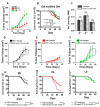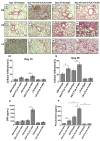Low-Salt Diet Reduces Anti-CTLA4 Mediated Systemic Immune-Related Adverse Events while Retaining Therapeutic Efficacy against Breast Cancer
- PMID: 35741331
- PMCID: PMC9219826
- DOI: 10.3390/biology11060810
Low-Salt Diet Reduces Anti-CTLA4 Mediated Systemic Immune-Related Adverse Events while Retaining Therapeutic Efficacy against Breast Cancer
Abstract
Immune checkpoint inhibitor (ICI) therapy has revolutionized the breast cancer treatment landscape. However, ICI-induced systemic inflammatory immune-related adverse events (irAE) remain a major clinical challenge. Previous studies in our laboratory and others have demonstrated that a high-salt (HS) diet induces inflammatory activation of CD4+T cells leading to anti-tumor responses. In our current communication, we analyzed the impact of dietary salt modification on therapeutic and systemic outcomes in breast-tumor-bearing mice following anti-cytotoxic T-lymphocyte-associated protein 4 (CTLA4) monoclonal antibody (mAb) based ICI therapy. As HS diet and anti-CTLA4 mAb both exert pro-inflammatory activation of CD4+T cells, we hypothesized that a combination of these would lead to enhanced irAE response, while low-salt (LS) diet through blunting peripheral inflammatory action of CD4+T cells would reduce irAE response. We utilized an orthotopic murine breast tumor model by injecting Py230 murine breast cancer cells into syngeneic C57Bl/6 mice. In an LS diet cohort, anti-CTLA4 mAb treatment significantly reduced tumor progression (day 35, 339 ± 121 mm3), as compared to isotype mAb (639 ± 163 mm3, p < 0.05). In an HS diet cohort, treatment with anti-CTLA4 reduced the survival rate (day 80, 2/15) compared to respective normal/regular salt (NS) diet cohort (8/15, p < 0.05). Further, HS plus anti-CTLA4 mAb caused an increased expression of inflammatory cytokines (IFNγ and IL-1β) in lung infiltrating and peripheral circulating CD4+T cells. This inflammatory activation of CD4+T cells in the HS plus anti-CTLA4 cohort was associated with the upregulation of inflammasome complex activity. However, an LS diet did not induce any significant irAE response in breast-tumor-bearing mice upon treatment with anti-CTLA4 mAb, thus suggesting the role of high-salt diet in irAE response. Importantly, CD4-specific knock out of osmosensitive transcription factor NFAT5 using CD4cre/creNFAT5flox/flox transgenic mice caused a downregulation of high-salt-mediated inflammatory activation of CD4+T cells and irAE response. Taken together, our data suggest that LS diet inhibits the anti-CTLA4 mAb-induced irAE response while retaining its anti-tumor efficacy.
Keywords: breast cancer; cancer biology; cytokines; immunotherapy; t-helper cells.
Conflict of interest statement
The authors declare no conflict of interest.
Figures







References
-
- American Cancer Society . Cancer Facts & Figures (2022) American Cancer Society; Atlanta, GA, USA: 2022.
-
- Sivapiragasam A., Ashok Kumar P., Sokol E.S., Albacker L.A., Killian J.K., Ramkissoon S.H., Huang R.S.P., Severson E.A., Brown C.A., Danziger N., et al. Predictive Biomarkers for Im mune Checkpoint Inhibitors in Metastatic Breast Cancer. Cancer Med. 2021;10:53–61. doi: 10.1002/cam4.3550. - DOI - PMC - PubMed
Grants and funding
LinkOut - more resources
Full Text Sources
Research Materials
Miscellaneous

